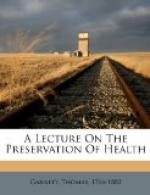When a part of the body only has been exposed to the action of cold, and the rest kept heated; if, for instance, a person in a warm room sits so that a current of air coming through a broken pane, should fall upon any part of the body, that part will be soon affected with an inflammation, which is usually called a rheumatic inflammation. From what has been said, it will be easy to account for this circumstance. The excitability of the part is accumulated by the diminution of its heat; but at the same time, the rest of the body and blood is warm; and this warm blood acting upon a part where the excitability is accumulated, will cause an inflammation; to which, the more you apply heat, the worse you make it.—From these considerations, we may lay it down as a fact, and experience supports us in so doing, that you may in general go out of warm into cold air without much danger; but, that you can never return suddenly from the cold into the warm air with perfect impunity.
Hence, we may lay down the following rule, which, if strictly observed, would prevent the frequent colds we meet with in winter. When the whole body, or any part of it, is chilled, bring it to its natural feeling and warmth by degrees.
But if, for want of observing this necessary caution, a cold, as it is called, should have seized a person, let us consider what is proper to be done.
It will, from the preceding reasoning, appear very improper to make the room where you sit warmer than usual, to increase the quantity of bed-clothes, to wrap yourself up in flannel, or particularly to drink a large quantity of barley-water, gruel, or tea, almost boiling hot, by way of diluting, as it is called, and forcing a perspiration; this will infallibly make the disorder worse, in the same manner as confining inoculated persons in warm rooms would make their small-pox more violent.
Perhaps there would be scarcely such a thing as a bad cold, if people, when they found it coming on, were to keep cool, and avoid wine and strong liquors, and confine themselves for a short time to a simple diet of vegetable food, drinking only toast and water. Instances are by no means uncommon, where a heat of the nostrils, difficulty of breathing, a short, tickling cough, and other symptoms, threatening a violent cold, have gone off entirely in consequence of this plan being pursued.
Colds would be much less frequent, were we to take more pains to accommodate our dress to the season: if we were warmly clothed in cold weather, our excitability would not be accumulated by the action of the cold. If a greater proportion of females fall victims to this disease, is it not because, losing sight, more than men, of its primary purpose, they regulate their dress solely by fantastic ideas of elegance? If happily, as is observed by Dr. Beddoes, our regret should recall the age of chivalry, to break the spell of fashion would be an atchievement worthy the most gallant of our future knights. Common sense has always failed in the adventure; and our ladies, alas! are still compelled, whenever the enchantress waves her wand, to expose themselves half undressed, to the fogs and frosts of our climate.




